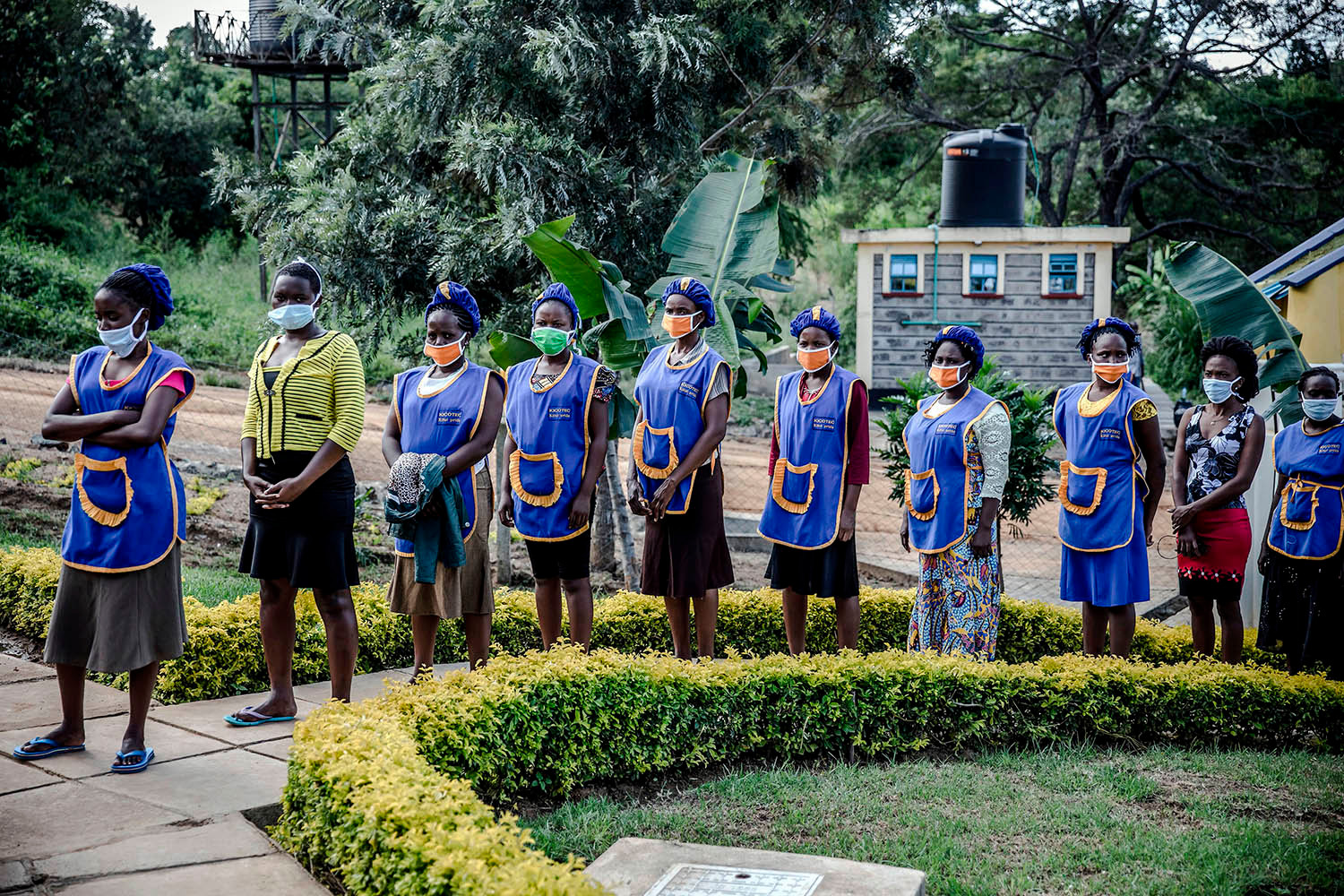NAIROBI—For the past week, every morning, Akonya Shimeseru wakes up in her single-room home that she shares with her two children in Ongata Rongai, a town on the outskirts of Nairobi. She makes tea, with sugar but no milk, and takes it with white bread. Then she sets out and roams for hours.
Shimeseru looks for work—washing clothes, manual labor, anything that might bring in a couple hundred Kenyan shillings ($1 to $2). After a long day of circling, she returns home and fixes dinner, which is always sukuma wiki and ugali, greens and maize. “People are afraid that if you’ve come from outside, you could be bringing in new problems,” she said one evening last week after one of her daily, futile walks. She and her children listen to the radio; no matter the hour, the news is always about the coronavirus.
Seven days ago, she worked as a cleaner—a domestic worker—before abruptly losing her job amid the global pandemic. Now, she doesn’t know how she’ll continue feeding her family.
But Shimeseru is hardly alone. Currently, the official number of confirmed coronavirus cases in Kenya is 184. Limited testing and test kits may mean the number is far higher. The public health measures being taken to curb the spread of the coronavirus—and the economic depression that accompanied them—have decimated the livelihoods of informal workers like Shimeseru who make up 83.6 percent of Kenya’s total workforce, according to the Kenya National Bureau of Statistics.
“People are doing what they need to do to survive, but this [often] means they’re not safe,” explained Jacqueline Wamai, a legal advisor at Kudheiha, a trade union that advocates for the Kenyan domestic workers’ rights. “It’s everybody for themselves right now.”
15 million informal workers
The issue isn’t unique to Kenya. Across the African continent, informal work is the main source of employment, accounting for 85.8 percent. (The figure stands at 40 percent across the Americas.) And across East Africa, women make up the majority of the share of informal employment in total (92.8 percent), while men aren’t too far behind (74.8 percent), according to the International Labour Organization (ILO). The reasons why informal employment so dominates in Africa, writes Ahmadou Aly Mbaye, a fellow at the Brookings Institution, lie on both the supply and demand sides: A growing, young population faces a dearth of training and employment opportunities, while at the same time commodities-based industries—such as agriculture, mining, and oil—do little to cultivate high-quality formal employment.
Kenya’s informal sector employs nearly 15 million Kenyans, according to 2018 estimates, compared to the 2.9 million who work in the formal sector. These 15 million Kenyans are the domestic workers, cleaners, beauticians, mechanics, and street vendors, among many more, who prop up the country, and yet they have few legal protections—no unemployment benefits, safety regulations, or social security.
Those vulnerabilities have been brutally exposed by the pandemic. Kenya confirmed its first positive case of the new coronavirus on March 13. Days later, the government shut down schools, banned religious gatherings, and suspended most international flights. Kenyan citizens and residents entering the country are required to quarantine in government-designated facilities at their own cost. The government also asked businesses to allow staff to work from home, “with the exception of employees working in critical or essential services.”
Around the country, open-air markets, where most people buy their food, are increasingly being closed by the government to stop the spread of the coronavirus, leaving hundreds of thousands of Kenyans jobless. Others are going to work in defiance of government orders, despite the risk to public health and their own, because they feel they have no choice.
Women trapped in the most vulnerable segments
While the number of Kenyans working in the informal sector is high, it is women who are usually trapped in the most vulnerable segments, such as cleaning and street selling, said Frédéric Lapeyre, a senior coordinator at the ILO. “They will suffer the most,” he said.
Shimeseru worked for a family in Karen, a wealthy Nairobi suburb where she would board for the week while cleaning and cooking. Since she lived in Ongata Rongai, where the first confirmed COVID-19 patient was located, her employers thought she might contract the coronavirus and bring it into their home. They told her to take two months of “unpaid leave.” Now, she has nearly no alternatives for earning income in a deflating economy approaching standstill.
If the loss of income wasn’t enough, social distancing measures also compound costs for the poor who work in the informal sector. For example, once matatus—privately operated minibuses that are the closest thing in Kenya to public transportation—were ordered to only fill half of their seats to maintain distance between passengers, operators doubled the fares.
Two-thirds of the capital’s residents live in informal settlements, where poverty, cramped conditions, and billowing fumes from charcoal fires make life hard. Social distancing measures have only compounded this. Without public piped water, residents pay a premium for water in a market controlled by cartels. Many live hand to mouth, without adequate safety nets or significant savings. They lack disposable cash, cannot stockpile food, and need a sustained income to meet basic needs.
Even though domestic workers are viewed as informal workers, says the legal advisor Wamai, they’re entitled to the same labor rights as other workers, such as getting paid a minimum wage, approximately $130 a month in a major city—but many aren’t. And while, in theory, employers and employees should mutually agree to “unpaid leave,” imbalanced power dynamics often means this isn’t the case.


 April Zhu
April Zhu
